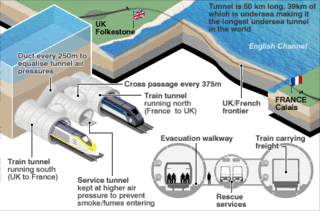Today we have a guest post by Andrew of How to learn Spanish

Hi, my name’s Andrew, I’ve been teaching myself Spanish on my own for about four years now, I run a blog on the subject of how to learn Spanish on your own where I share my own experiences and tips, and today I just thought I’d share a funny story with you concerning a certain Spanish word I learned about a few months ago…
So I was in the process of going through a Notes in Spanish lesson (which I highly recommend, the audio is free, start at the beginner’s level, honestly no, you don’t need the worksheets) when I came across the term “túnel” which I presumed to mean “tunnel”, which it did, and so I added it to Anki along with an example phrase that I see in the dictionary, “Túnel del Canal de la Mancha” which refers to the English Channel tunnel, aka “the chunnel”.
Anytime I see a new word I don’t know, I have to look it up and add it to Anki, I’m a bit OCD and looking up a single word in the dictionary can cause a chain reaction that leads to me looking up and adding 10 more words. I do not know this word, “mancha”, what is this? I look it up. It means…”spot, blotch, stain, blemish, or liver spot”. This makes no sense: “Canal de la Mancha” = “Canal of the Spot”? “Canal of the stain”? “Canal of the liver spot”?!
Right, we’re going to sort this out, something funny’s going on here…
I initially think that maybe it refers to “spot” in the sense of a location, which actually is like the 8th definition down for the word “mancha” in my dictionary, so it’s possible, but…further googling turns up the Spanish wikipedia page for the English Channel, and within the very first paragraph I see:
El nombre no es más que una mala traducción del francés, ya que La Manche significa realmente ‘La Manga’, puesto que es la misma palabra que se emplea para designar a la parte de la camisa dentro de la cual se mete el brazo.
Which means:
The name is no more than a bad translation of the French, as La Manche actually means ‘The Sleeve’, since it’s the same word that’s used to designate which part of the shirt you put your arm into.
Ahhhh hahaha! I look up “manche” in the French dictionary, it means “sleeve”, I look up “manga” in the Spanish dictionary, it means “sleeve”. Ohhh boy. Ok, that explains it.
So what has happened here is that the Spanish heard the word “la manche” from the French when they were referring to the English Channel and then sort of simultaneously borrowed and mangled the French word for it instead of actually translating it (if they knew that it meant “the sleeve” they would’ve ended up with “la manga” in Spanish, but they didn’t know this), thereby ending up with “la mancha” as an adulteration of “la manche”. In other words, in the phrase “Canal de la Mancha”, the word mancha does not mean “spot, stain etc.”, in fact, it doesn’t mean anything, it’s just a name–sort of like if you’ve got a dog called “Spot”, in that particular context the word “spot” doesn’t mean “spot”, it doesn’t ‘mean’ anything, it’s just the name of the damned dog 😀
Yes, I was amused by this, thank you, I realize you may not be. If you did perhaps find it amusing or you’re simply interested in the Spanish language you might like to come on over and see what else I’ve got (a lot of people like the Shakira-series I’ve done where I teach you Spanish using her music videos), I’d be glad to have you!
Cheers,
Andrew
I, like Andrew, cannot just look up one word in a dictionary. It invariable involves looking up several others, sometimes related, sometimes just random on a page I land on. In fact, I often forget what word I was looking up. Online dictionaries don’t have the same distractions.
Unlike Andrew though, I don’t consider it a bit OCD – rather, CDO – it’s the same disorder, but the letters are in the correct order, just as they should be – alphabetical!
Hi Andrew,
It may amuse you to remember that Don Quixote (Cervantes) came from La Mancha, the Man from La Mancha. It is situated in the South-East of Spain thus nowhere near the Channel.
Regards,
Gerard